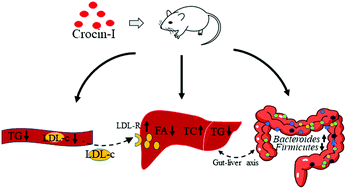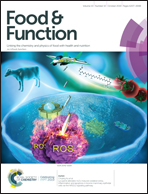Crocin-I ameliorates the disruption of lipid metabolism and dysbiosis of the gut microbiota induced by chronic corticosterone in mice†
Abstract
Glucocorticoids (GCs) are widely used as anti-inflammatory and immunosuppressive drugs. However, chronic treatment with GCs in clinical settings has a series of side effects, such as metabolic disorders, gut microbiota dysbiosis and neurological impairment. Therefore, searching for a functional substance that can alleviate these side effects is greatly meaningful to clinical patients. Crocin is the main active ingredient of saffron, which has been reported to have numerous pharmacological activities. However, the action of crocin-I, one major member of the crocin family, on the physiological mediation in the individuals receiving GC treatment remains unclear. In this study, we aimed to evaluate the efficacy of crocin-I on lipid metabolism and the gut microbiota in a mouse model of chronic corticosterone (CORT) treatment. Our findings showed that crocin-I reduced the levels of triglycerides and total cholesterol and the ratio of low density lipoprotein to high density lipoprotein in the serum of CORT-treated mice. In addition, transcriptome analysis revealed that crocin-I was effective in mediating the amelioration of lipid metabolism, mainly in fatty acid metabolism and steroid biosynthesis in CORT-treated mice. Moreover, metabolome analysis demonstrated that crocin-I could restore the disturbed metabolites in the liver of CORT-treated mice, most of which are long-chain fatty acids. Furthermore, high-throughput sequencing of 16s rRNA revealed that crocin-I could mitigate the dysbiosis of the gut microbiota caused by CORT at a dose of 40 mg kg−1, by resulting in a significant increase in the alpha diversity of the microbes in the cecal contents and a significant reduction in the abundance of Firmicutes, whereas by increasing the abundance of Bacteroidetes. These results indicated that oral administration of crocin-I could modify the composition of the gut microbiota and alleviate hepatic lipid disorder in mice treated with a high dose of GCs.



 Please wait while we load your content...
Please wait while we load your content...